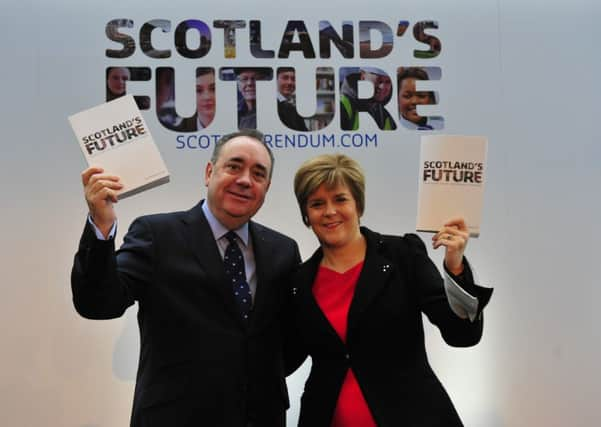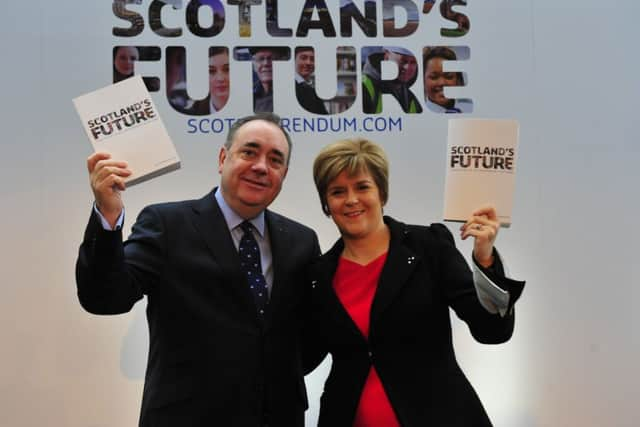Civil service chief denies white paper ‘bias’


Sir Peter Housden told MPs on the Commons public administration committee that he was not aware of any breaches of the civil service code in Scotland, which prevents government officials from expressing political views, and insisted that the role of civil servants was to “provide advice for the government”.
He said: “You are working within the code and law to serve the government of the day regardless of its political complexion.”
Advertisement
Hide AdAdvertisement
Hide AdHe added that civil servants needed to “preserve the capacity to serve potential successor governments”.


Asked about reports that he and 30 senior colleagues had attended 13 pro-independence roadshow events around the country with Cabinet ministers since the Scottish Government’s white paper was published last November, Sir Peter reminded members of the committee that the referendum “is not an election”.
He said civil servants attended the events to “provide answers and give advice”.
“The ministers are there to be held to account for their white paper and their policy,” he told MPs. “Civil servants are in their characteristic role in those type of functions. They were not standing up defending government policy.”
Bernard Jenkin, the committee’s Conservative chairman, said that civil servants would not be present at such events during an election campaign.
Sir Peter responded: “I think the distinction you draw is an important one because this is a referendum not an election, and it is an issue about policies not about parties. This is a perfectly normal way that civil servants are active in their duties.”
Sir Peter was also asked about civil service involvement in the production of the white paper on independence which opponents of the SNP have described as a “manifesto”.
He replied that the white paper was intended to “present government policy” as well as demonstrating what could be achieved with the powers obtained through independence.
Advertisement
Hide AdAdvertisement
Hide AdSir Peter, who was appointed Scotland’s permanent secretary in July 2010, said he had not taken a position on the referendum. He told MPs: “I have not expressed any views on the question of the referendum outcomes, yes or no. And I think that this kind of issue, albeit in heightened form in Scotland, is the type that is presented to civil servants repeatedly as administrations change. So in 2010, one day I was working for John Denham (Labour) and the following day I was working for Eric Pickles (Conservative).”
Sir Peter was giving evidence yesterday as part of the committee’s inquiry into whether civil servants working for the Scottish and UK governments have breached impartiality rules during the referendum campaign.
The committee also heard yesterday from Sir Bob Kerslake, the head of the UK civil service. He agreed with Sir Peter that there was no evidence of any breach of the civil service code. Speaking on behalf of himself and Sir Peter, Sir Bob said there was a difference between impartiality and neutrality.
Asked by Labour MP Lindsay Roy to explain the difference, Sir Bob replied: “We are required and expected to serve the government of the day. We are not neutral to government policy.
“Our role is to support the government in the delivery of their policy and I would expect civil servants to be taking forward government policy with enthusiasm and commitment. That is part and parcel of our responsibility.”
He was asked if he would intervene, as head of the British civil service, if there was a breach of “purdah” in Scotland – the period in the run-up to a vote when civil servants cannot actively promote government policy. Sir Bob said it would be “a matter for the Scottish Parliament”.
Last night, supporters of the Better Together campaign dismissed Sir Peter’s evidence.
Labour MP Anne McGuire said: “The white paper is nothing more than a taxpayer-funded manifesto by the SNP designed to advance their dream of breaking up the UK. The idea that it was an impartial civil service document simply isn’t credible.
Advertisement
Hide AdAdvertisement
Hide Ad“The fact that civil servants are travelling around Scotland at public expense to promote the white paper is unacceptable.”
Since he took up his post at St Andrew’s House in Edinburgh, Sir Peter has faced of allegations that he has overstepped the mark by entering the political debate.
Claims made against him included his reported criticism of the UK government’s health policy, although he was later cleared of breaching impartiality rules by Sir Gus O’Donnell, the former head of the civil service.
He was also accused of circulating a briefing to other civil servants in which he appeared to be predicting a victory for the Yes campaign.
Last night, a Scottish Government spokesman said: “The civil service has held up well, helping both governments to inform the debate and make their respective cases in a safe, fair and legal referendum process that has been widely praised.”
Impartial role
For the civil service “impartiality” and “neutrality” are terms that apply differently to their work.
While the civil service code says that officials should be impartial, it does not say they should be neutral. Being impartial means that a civil servant will help develop and promote the policy of the government of the day.
In carrying out that responsibility the civil service is not neutral and will help argue against the opposition, but should the opposition become the government it will take the other point of view.
Advertisement
Hide AdAdvertisement
Hide AdSir Bob Kerslake, the head of the UK civil service, said civil servants are “required” to support the policy of the government of the day “with enthusiasm”.
SEE ALSO